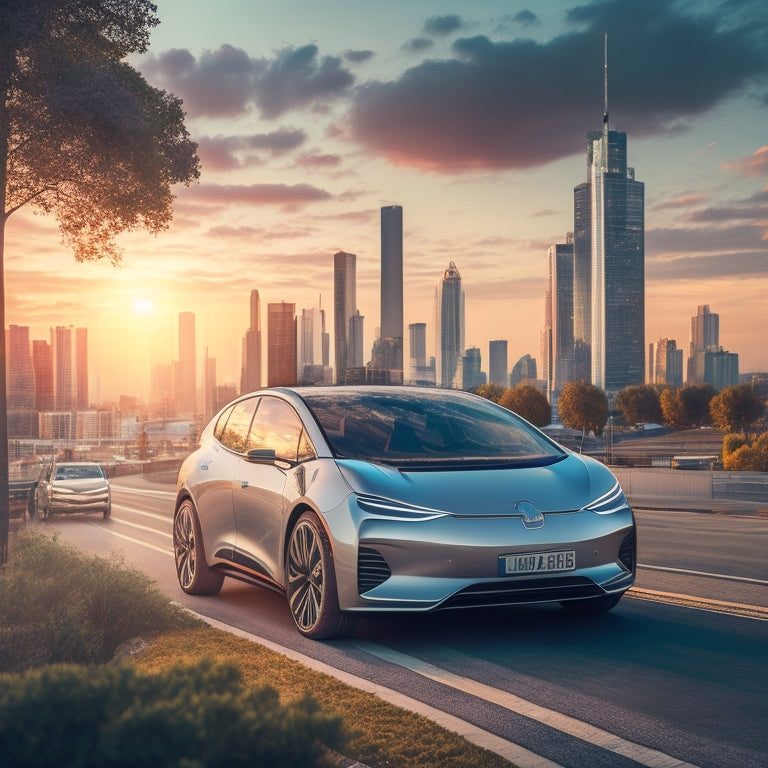
Electric Vehicles: Benefits, Charging, and More
Share
Moreover, extensive Electric vehicles offer a multitude of advantages, including reduced operating costs, minimized environmental impact, and enhanced performance, making them an attractive alternative to traditional gasoline-powered vehicles. They provide quieter operation, instant torque, and less maintenance due to fewer moving parts. A global charging network supports EV adoption, driven by advancements in battery technology. Moreover, EVs mitigate air pollution, have a lower carbon footprint, and improve air quality and human health. As you explore the benefits of electric vehicles, you'll discover the intricacies of their advantages and how they can benefit your daily commute and the environment.
Key Takeaways
• Electric vehicles offer lower operating costs, reduced greenhouse gas emissions, and quieter operation, making them an environmentally friendly option.
• A comprehensive network of charging stations globally, driven by advancements in battery technology, supports convenient EV ownership.
• EVs produce zero tailpipe emissions, mitigating air pollution in urban areas, and have a lower carbon footprint over their lifetime, combating climate change.
• Instant torque and regenerative braking technology provide rapid acceleration, smooth operation, and energy efficiency in electric vehicles.
• Government incentives, lower fuel costs, and reduced maintenance expenses contribute to a lower total cost of ownership, making EVs a financially prudent choice.
Electric Vehicle Advantages Explained
Five key benefits make electric vehicles an attractive alternative to traditional gasoline-powered cars:
- Lower operating costs
- Reduced greenhouse gas emissions
- Quieter operation
- Instant torque for quick acceleration
- Less maintenance required due to fewer moving parts
EV battery technology has improved greatly, alleviating range anxiety concerns. With advanced battery management systems, electric vehicles can travel longer distances on a single charge.
Furthermore, reduced greenhouse gas emissions contribute to a cleaner environment, aligning with the growing concern for environmental sustainability. The instant torque provided by electric motors enables rapid acceleration, enhancing the overall driving experience.
Additionally, fewer moving parts result in lower maintenance costs, making electric vehicles a cost-effective option for eco-conscious drivers.
Charging Infrastructure Overview
A comprehensive network of charging stations has emerged globally, providing electric vehicle owners with convenient and efficient refueling options. This growth is driven by advancements in battery technology, enabling faster and more efficient charging.
The charging infrastructure is designed to guarantee seamless grid integration, minimizing the strain on the electrical grid. With various charging speeds available, including Level 1, Level 2, and DC Fast Charging, drivers can choose the most suitable option for their needs.
Additionally, home charging options and smart charging solutions optimize energy consumption, reducing the strain on the grid. As the network continues to expand, electric vehicle adoption is poised to accelerate, further reducing our reliance on fossil fuels and mitigating the environmental impact of transportation.
Environmental Impact Assessment
Electric vehicles, with their zero-tailpipe-emission design, greatly reduce air pollution in urban areas, thereby mitigating the respiratory and cardiovascular health impacts associated with fossil fuel combustion.
By producing zero tailpipe emissions, electric vehicles markedly decrease air pollution, leading to improved air quality. This, in turn, reduces the adverse impacts on human health and the environment.
Additionally, electric vehicles have a lower carbon footprint over their lifetime, contributing to a decrease in greenhouse gas emissions. As a result, electric vehicles play an essential role in combating climate change.
Performance and Efficiency Gains
The instant torque provided by electric motors enables rapid acceleration, making electric vehicles particularly well-suited for urban driving environments where rapid acceleration and deceleration are common. This improved acceleration, combined with regenerative braking technology, allows electric vehicles to recover kinetic energy and increase efficiency. As a result, electric vehicles can achieve remarkable performance while minimizing energy waste.
-
Smooth and quiet operation due to the electric motor
-
Lower center of gravity for improved handling and stability
-
Energy recovery systems to maximize range and efficiency
- Regenerative braking technology to recharge the battery and increase range
Cost Savings and Incentives
Financial prudence is a key consideration for many prospective electric vehicle owners, as the initial purchase price may be higher, but the total cost of ownership is often lower due to various incentives and savings opportunities.
Government incentives, such as tax credits and rebates, can greatly reduce the upfront cost of purchasing an electric vehicle. In addition, ownership savings can be substantial, with lower fuel costs and reduced maintenance expenses compared to gasoline vehicles.
Moreover, electric vehicles often retain their value better, resulting in a higher resale value. By combining these benefits, electric vehicle owners can enjoy significant cost savings over time, making them a financially prudent choice for many drivers.
Frequently Asked Questions
Can Electric Vehicles Be Charged Using Solar Power at Home?
'Yes, electric vehicles can be charged using solar power at home, leveraging home incentives and optimizing panel efficiency. This setup guarantees a sustainable energy source, minimizing carbon footprint and operating costs, while prioritizing safety and environmental responsibility.'
How Do Electric Vehicles Perform in Extreme Cold or Hot Temperatures?
Electric vehicles' Cold Performance and Heat Resistance are impacted by battery chemistry and thermal management systems, which can affect range and efficiency in extreme temperatures, but advanced designs and materials mitigate these effects to guarantee safe and reliable operation.
Are Electric Vehicles More Prone to Battery Fires Than Gasoline Vehicles?
"When it rains, it pours," but in the case of electric vehicles, battery safety is a top priority, and fire risks are mitigated through robust design, testing, and certification standards, ensuring a negligible likelihood of battery fires compared to gasoline vehicles.
Can Electric Vehicles Be Used for Long Road Trips Without Charging Issues?
For long road trips, electric vehicles can be a viable option with proper route planning, ensuring access to charging infrastructure, and roadside assistance services that cater to EVs, mitigating charging issues and ensuring a safe journey.
Do Electric Vehicles Have a Shorter Lifespan Than Traditional Gasoline Vehicles?
Electric vehicles' battery durability and vehicle reliability are comparable to traditional gasoline vehicles, with studies showing minimal battery degradation and average lifespans exceeding 15 years, ensuring a safe and reliable driving experience.
Related Posts
-

Why Transform Human Waste Into Garden Gold?
By changing human waste into garden gold, you'll reduce waste management costs, support sustainable agriculture, and ...
-

7 Smart Air Purification Hacks for Energy-Savvy Homes
You can notably improve your indoor air quality while minimizing energy consumption by implementing strategic air pur...
-

10 Best Sustainable Waste Management Solutions for Green Homes
You're likely unaware that the average green home generates over 2 kilograms of waste daily, but with the right susta...


